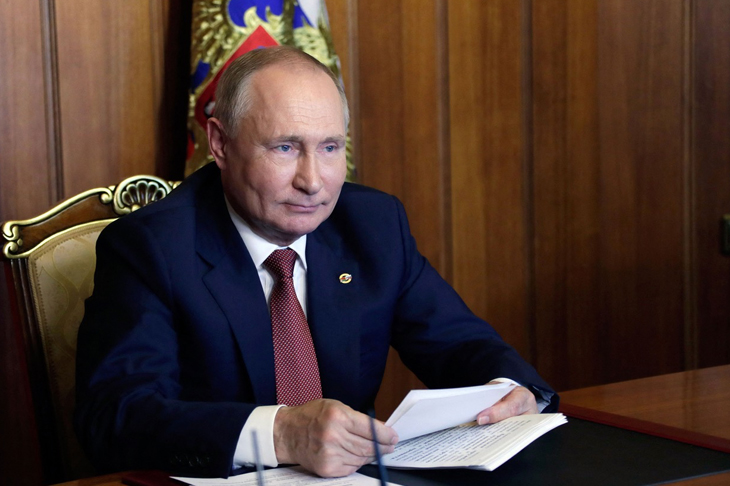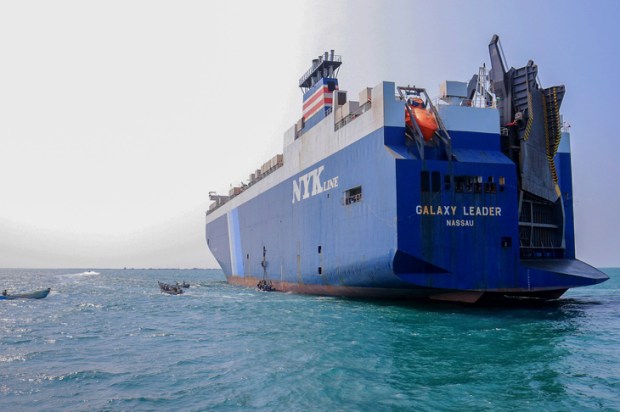There’s a very clear reason why Ukraine is now exposed to a Russian invasion while other small countries, such as the Baltic states, that were once part of Russia are not. Ukraine is not part of NATO while Latvia, Lithuania and Estonia are.
Article 5 of the North Atlantic Treaty Organisation charter states that ‘an attack against one…of them…shall be considered an attack against all of them’ precipitating ‘the use of armed force to restore and maintain the security of the North Atlantic area’. In other words, the NATO charter binds the big powers, Britain, France and the United States, to defend the small powers such as the Baltic states should they come under attack. As well, all the Baltic states, even though they are relatively recent NATO members, host on their soil troops from Britain, Canada and Germany. Hence any Russian attack on them would inevitably involve fighting the armed forces of more powerful countries.
Russia is currently demanding that allied armed forces be removed from all the countries that have joined the alliance since the collapse of the old Soviet Union, namely from the Baltic states and from Poland which have hosted allied forces for the past few years since Russia’s designs on its former territories and satellites became obvious. As long as allied forces remain, despite their close proximity those countries are comparatively safe from Russian irredentism and territorial claims. This is because Russia doesn’t want to risk a war it might lose.
In contrast, the country that’s currently exposed – Ukraine – has not been admitted to NATO and hosts no allied troops (other than a British military training team). That’s why Russia’s armies are currently massed around Ukraine, a country of 44 million people with about a million regular and reserve soldiers – and not around the Baltic states that, in themselves, are much smaller and softer targets.
A full-scale Russian assault on the small Baltic states would be over in days, whereas even a scarcely contested invasion of Ukraine would take weeks to complete in a country that’s 500 kilometres from north to south, 1,000 kilometres from east to west, and bisected by the mighty Dnieper River which makes the Murray look like a billabong. The difference is that no allied troops would be involved, and no other countries are legally and morally bound to come to Ukraine’s aid.
Yet there remains one ambiguity.
In 1994, as the old Soviet Union was breaking up, Ukraine agreed to surrender to Russia the nuclear weapons that had been based on its territory. In return, under the Budapest Security Assurances signed by the United States, Britain, and Russia (via Bill Clinton, John Major and Boris Yeltsin for their respective countries) the signatories ‘reaffirm(ed) their commitment… to respect the independence and sovereignty and the existing borders of Ukraine’. Russia undertook ‘to refrain from the threat or use of force against the territorial integrity or political independence of Ukraine’ while the US and the UK ‘reaffirm(ed) their commitment… to provide assistance…should Ukraine become a victim of an act of aggression’.
This Anglo-American guarantee is moral rather than legal. It’s much vaguer than the provisions of the NATO charter and has never been backed up by the prepositioning of forces or a functioning command structure. Still, this was the basis on which the Ukraine felt comfortable forfeiting the nuclear weapons that would have rendered it seemingly invulnerable to attack from its former overlord.
Despite this, when Russia launched its proxy takeover of the Crimea in 2014 and instigated the rebellion in eastern Ukraine (which dragged in Australia when a Russian missile battery shot down MH17 killing 38 of our citizens) and which has so far killed about 10,000 Ukrainian soldiers, there was virtually no response from either the UK or the US other than some modest sanctions against Russian banks and on technology transfers.
Along with America’s failure to respond to China’s militarisation of the South China Sea and failure to enforce President Obama’s ‘red line’ against the use of chemical weapons in Syria, it’s this monumental failure that’s emboldened anti-Western dictatorships to start pushing against what they increasingly think is an open door.
Dictators like Vladimir Putin and Xi Jinping (plus the Iranian ayatollahs and Turkey’s autocratic President Erdogan) have concluded that an effete and decadent West is no longer mentally tough enough to resist aggression, especially aggression that stops short of a direct attack on the main Western powers themselves.
In the short term that means no immediate threat to the safety and security of the citizens of the main Western powers. In the medium term, though, as Russia effectively reconstitutes the old Soviet Bloc and China creates its own version of a South-East Asian Co-Prosperity Sphere, the dictatorships will gain client states while the economic strength and cultural morale of the democracies is progressively sapped.
Here in Australia, we might think that distance protects us from wars over Ukraine or Taiwan – but it won’t protect us from their consequences, such as massive dislocation in trade or the potential need to spend much more on our armed forces in a world that can no longer rely on America as its benign policeman.
In 1938, the then British prime minister Neville Chamberlain refused to get involved in a ‘quarrel in a far away country between people of whom we know nothing’.
As it transpired, surrendering Czechoslovakia to the Nazis weakened the West, emboldened Hitler and didn’t stop war breaking out scarcely a year later. True, Putin isn’t quite Hitler, communist China is not quite militarist Japan and history never exactly repeats itself. Still the parallels with the 1930s are frightening, especially the West’s inability to be clear about what it stands for and what it’s against and to back up mere words with the credible threat of force.
Got something to add? Join the discussion and comment below.
Get 10 issues for just $10
Subscribe to The Spectator Australia today for the next 10 magazine issues, plus full online access, for just $10.
Ross Fitzgerald is Emeritus Professor of History and Politics at Griffith University. His most recent books are a memoir Fifty Years Sober and the co-authored political/sexual satires The Dizzying Heights and The Lowest Depths, published by Hybrid in Melbourne.
You might disagree with half of it, but you’ll enjoy reading all of it. Try your first month for free, then just $2 a week for the remainder of your first year.














Comments
Don't miss out
Join the conversation with other Spectator Australia readers. Subscribe to leave a comment.
SUBSCRIBEAlready a subscriber? Log in